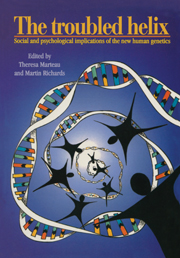Book contents
- Frontmatter
- Contents
- List of contributors
- Preface
- Preface to the paperback edition
- Acknowledgements
- Part I Personal stories
- Part II Clinical context
- 2 The new genetics: a user's guide
- 3 Decision-making in the context of genetic risk
- 4 Genetic counselling: some issues of theory and practice
- 5 Evaluating carrier testing: objectives and outcomes
- 6 Psychosocial aspects of prenatal screening and diagnosis
- 7 The genetic testing of children: a clinical perspective
- 8 Predictive genetic testing in children: paternalism or empiricism?
- Part III Social context
- Index
2 - The new genetics: a user's guide
from Part II - Clinical context
Published online by Cambridge University Press: 01 June 2011
- Frontmatter
- Contents
- List of contributors
- Preface
- Preface to the paperback edition
- Acknowledgements
- Part I Personal stories
- Part II Clinical context
- 2 The new genetics: a user's guide
- 3 Decision-making in the context of genetic risk
- 4 Genetic counselling: some issues of theory and practice
- 5 Evaluating carrier testing: objectives and outcomes
- 6 Psychosocial aspects of prenatal screening and diagnosis
- 7 The genetic testing of children: a clinical perspective
- 8 Predictive genetic testing in children: paternalism or empiricism?
- Part III Social context
- Index
Summary
The impact of discoveries in medical genetics
There are some 4000 known, simply-inherited genetic disorders and, in aggregate, they are the cause of much suffering in 1–2% of the population. The common disorders include cystic fibrosis, sickle cell disease, the thalassaemias, fragile-X syndrome, Duchenne muscular dystrophy, haemophilia A, Huntington's disease, neurofibromatosis and adult polycystic kidney disease.
We ‘fight’ germs, but such language seems inappropriate for genetic disease because our genes, whether faulty or not, are an integral part of our makeup. Genetic testing can forewarn potential parents, but also pose moral dilemmas. Genetic knowledge can impose a burden of choice: a choice of whether to forgo children, trust to luck or seek prenatal diagnosis with the option of abortion if the baby is affected.
Although it is widely recognised that improvements in the treatment of genetic disease are desperately needed, some fear that ‘tinkering’ with our genes and the use of modified viruses as vehicles, or vectors, to deliver new genes to the body might be dangerous in some way to the population at large. Informed public debate needs an informed public, and that includes health professionals. Families facing these issues need help: genetic services, counselling and support in coming to a decision that is right for them.
What follows is intended as a simple guide to how genes work and sometimes fail. It explains how genetic tests are done and touches on some of the issues raised by advances in genetic testing.
Information
- Type
- Chapter
- Information
- The Troubled HelixSocial and Psychological Implications of the New Human Genetics, pp. 63 - 81Publisher: Cambridge University PressPrint publication year: 1996
Accessibility standard: Unknown
Why this information is here
This section outlines the accessibility features of this content - including support for screen readers, full keyboard navigation and high-contrast display options. This may not be relevant for you.Accessibility Information
- 3
- Cited by
